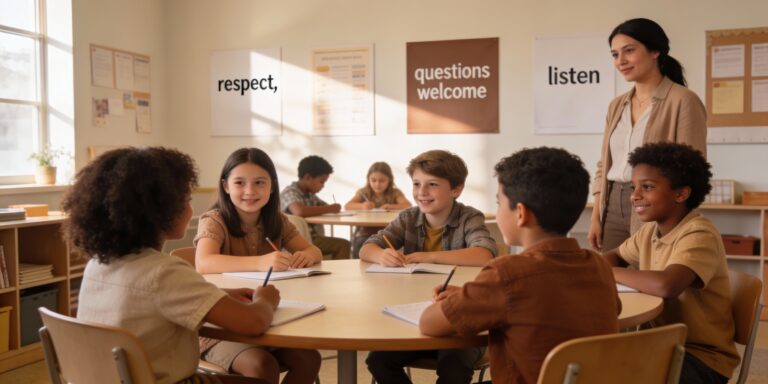Sexual Health
According to the World Health Organization (WHO), “Sexual health is a state of physical, emotional, mental and social well-being in relation to sexuality; it is not merely the absence of disease, dysfunction or infirmity.” This means that puberty education in the United Kingdom must include multiple facets, not just physical changes.
Puberty education is a subset of the larger topic of sex education, which is often called Relationships and Sex Education (RSE) in UK schools. Puberty education focuses on the developmental stages that happen as children begin puberty, most often in Years 4-7 or Primary 5-7.
Sex Education in United Kingdom Schools
In the United Kingdom, most schools teach sex education, but the quality and content of the education vary greatly. In some schools, sex education is still limited to basic information about anatomy and reproduction. In others, sex education covers a range of topics, including relationships, sexual health, contraception, and STI prevention. England, Scotland, Wales, and Northern Ireland each have their own education systems, contributing to wide variations in how and what sex education is taught.
Relationships and sex education (RSE) is required in these two countries:
England’s Department for Education has jurisdiction over education, including RSE.
- Relationships and Sex Education in Schools (England)
- The National Curriculum, gov.uk
- Relationships education: From September 2020, all primary age children will learn relationships education and health education, and all secondary age children will learn relationships and sex education (RSE) and health education.
- Primary schools: Relationships education is compulsory for all primary and secondary school pupils. Primary schools can choose to teach sex education but it’s not compulsory. Parents can withdraw their child from sex education in primary school.
- Secondary schools: Sex education is compulsory in secondary schools. Parents can ask to withdraw their child from parts or all of sex education taught as part of relationships and sex education. Parents cannot withdraw their child from sex education taught in science.
- Relationships, sex and health education: guides for parents, Click here.
Wales has its own education department; however, it closely adheres to the education requirements in England.
- Curriculum for Wales (2022-present) Click here.
Relationships and sex education (RSE) is not required in these two countries:
Scotland has its own education department. They call sex education “Relationship, Sexual Health and Parenthood (RSHP) curriculum.
- Relationships, sexual health and parenthood, Education Scotland
- Relationships, sexual health and parenthood, RSHP Scot
Northern Ireland has its own education department. They call sex education “Relationships and Sexuality Education.”
- Relationships and sexuality education, Department of Education
- Relationship and sexuality education (RSE) Guidance, Department of Education
- Sex education in schools could be made compulsory by NI secretary, BBC News
Support for Sex Education in the United Kingdom
These agencies offer information and/or support related to sexual health:
- Brook
- Sexual Health, National Health Service (HNS)
- Sex Education Forum
- Health for Teens
- Young Persons Advice Guide, Lets talk about it
- National Sexual Health Helpline, 0300 123 7123
Challenges for Sex Education in the United Kingdom
Teachers report that they need more training to provide RSE that is current as required by the new law that took effect in September 2020. The pandemic further complicated implementation of the new requirements.
A 2019 survey[1] revealed that half of teachers say they lack confidence to teach the compulsory relationships education in primary schools and RSE in secondary schools. School headteachers also reported that the new curriculum requirements are important since the previous curriculum hasn’t been updated since the advent of social media, sexting, and online porn.
In response, the government allocated money to provide the training teachers requested. Since the training is not compulsory, and schools must request the training, only half of the allocation has been spent.
If a sampling of articles is accurate, both students and educators are dissatisfied with the way sex education is done in the UK:
- UK Gov only spent half the sex education training money it promised, Vice World News
- Sex education review announced after MPs raise concerns, BBC News
- Sex education review is “politically motivated,” say teaching unions, The Guardian
- UN education report: Young people don’t think politicians listen to them, BBC News
- Sex education in schools is contributing to a culture of misogyny and letting down our young women – it’s time that changed, Glamour, UK
- Sex education “could bring conflict with parents and governors,” BBC News
[1]NEU and NSPCC survey into school readiness for RSE lessons 2020



